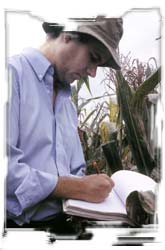March, 2005
 Now that all of CIMMYT’s new program directors have been officially installed, it is time to get acquainted with them, as well as their ideas and plans for the programs. This month we feature Rodomiro Ortiz, director of the Intensive Agro-Ecosystems Program.
Now that all of CIMMYT’s new program directors have been officially installed, it is time to get acquainted with them, as well as their ideas and plans for the programs. This month we feature Rodomiro Ortiz, director of the Intensive Agro-Ecosystems Program.
What would it take for an accomplished scientist to move to Mexico? For Rodomiro Ortiz, director of the Intensive Agro-Ecosystems Program, all took was a new strategy for CIMMYT. In the new plan he saw a change and a challenge, and he knew that the Intensive Agro-Ecosystems Program could empower research to improve lives. “Science can really impact development—this program interests me because of the relevance it has on livelihoods.” Ortiz comes to CIMMYT, his fourth CGIAR Center, with much experience and a strong tradition for sharing science. “We want to encourage local production in ways that create wealth and reduce risk for farmers and both the rural and urban poor,” he says.
A source of food and income security for rural and urban households in Asia, North Africa, and Latin America, intensive agricultural systems feature large areas of maize and wheat, often accompanied by a combination of other crops. “A large number of the world’s poor live in densely populated, rural areas where their crops sustain local communities and neighboring cities, but they face many problems,” says Ortiz. Production limitations include unsustainable exploitation of water and soils, inefficient use of chemical inputs, and emerging or worsening disease and pest problems. Looking to the future, he says, “While continuing our success in wheat breeding, we want to enhance our maize research and pursue the science behind conservation agriculture.”
Balancing productivity with healthy cropping systems in key areas is a priority for this program. “Enhanced and sustained productivity will help improve human health and rural household food security, and natural resource management is an integral part of this goal,” recognizes Ortiz. With technology such as zero tillage and retained residues, systems can be both productive and ecologically sound. “Together with the Rice-Wheat Consortium, we’ve shared conservation agriculture with over 250,000 farmers in the Indo-Gangetic Plains who now are saving water and decreasing fuel use, all of this while increasing their yields,” he says. Ortiz would like to mirror this momentum in the Mediterranean littoral (coastal region), the Yellow River Basin, and northwestern Mexico, other focus areas for the program.
A Peruvian national, Ortiz holds a PhD from the University of Wisconsin in plant breeding and genetics and received his BSc and MSc degrees from UNALM (Universidad Nacional Agraria La Molina, Peru). Having worked abroad in the USA, Nigeria, Denmark, India, and most recently in Uganda as director of Research-for-Development at IITA, he carries knowledge of 15 different food crops, maize and wheat included. This background has given him vast experience in cropping systems and management. Ortiz, with hundreds of publications to his name, loves intellectual discourse and discovering how old problems can be solved using innovative approaches. “This new strategic plan continues in CIMMYT’s tradition to excel serving the resource poor,” Ortiz says.
 Capacity development
Capacity development 
